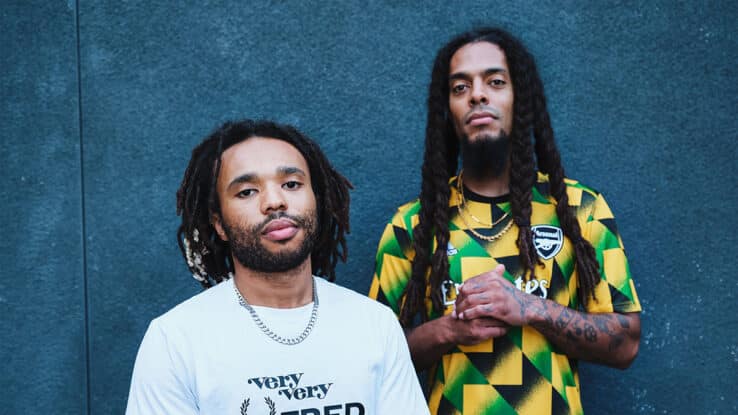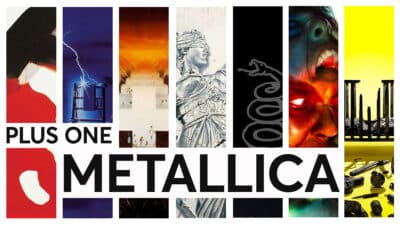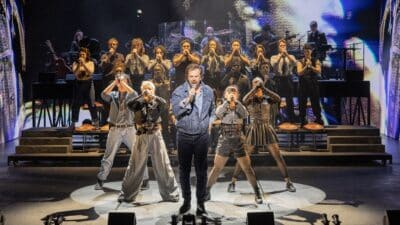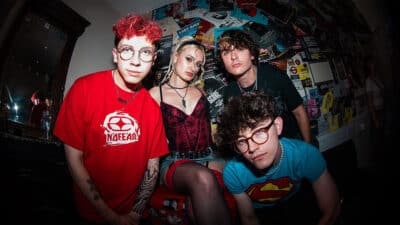Interview

Interview
Bob Vylan: “We want our shows to be an equal exchange”
The fast-rising UK grime punk duo on carving out their own path, building a community and the importance of group hugs
Just a few years ago, Bob Vylan wouldn’t have been voted most likely to achieve UK chart success.
A duo who emerged from the London underground with an album so unapologetically honest about institutional racism, class struggles and capitalism that labels deemed it too ‘extreme’ for release, 2020’s We Live Here unveiled a provocative grime punk project that served as the antithesis to the modern mainstream.
Uncensored, fully independent, and unafraid to lift the veil on the uglier side of life in Britain, the duo’s debut saw them forge their own path after years of being pushed aside by the music industry – a hard-fought battle that led to them crashing into the Top 20 with 2022’s follow-up Bob Vylan Presents the Price Of Life.
Crowned as the first ever winners of the MOBO’s Best Alternative Act category last December, Bob Vylan are refusing to water themselves down for the comfort of others. Determined to prove that anything is possible with enough passion and self-belief ahead of their biggest UK shows to date, singer/guitarist Bobby Vylan and drummer Bobbie Vylan open up about the creation of their own record label, plans for their new live show, and the importance of community in making it all possible.
It’s been a busy couple of years for Bob Vylan, from scoring your first Top 20 album to winning a MOBO Award, and dominating the festival scene. How does it feel to reflect on the journey you’ve been on since the release of Bob Vylan Presents the Price Of Life last year?
Bobby Vylan: In a way I think it feels like an explosion, but we’ve been working at it for a long time. We’ve seen all the graft that has gone into this behind the scenes, so I suppose it’s hard for it to feel as explosive as it may seem on the outside. We’ve had to go through the sleepless nights, the packing of the merch, and all the other things that it took to get us to this point. It has all happened very quickly, but perhaps not as quickly as it seems to other people.
Bobbie Vylan: It’s interesting because it’s felt like a natural transition. It doesn’t feel like it’s come out of nowhere, but at the same time, sometimes I don’t realise just where we’re at now. When people recognise me in the street, I get it, but it’s like, “What the f*ck, who are you?!”
Bobby: That catches me out every single time. I still don’t understand how people know who I am, and it happens in the maddest of places. I’ll be somewhere super random, and then I’ll get a DM saying, “I think I saw you the other day”. It’s weird, but we’re enjoying every moment of it.
Your sound darts between rap, rock, punk and grime, but ultimately seems defined by political and social commentary. When it comes to lyric writing, where do you find your inspiration?
Bobby: I always think of the lyrics as being rap or grime lyrics, it just so happens that the production leans more towards a punk style. When the two come together, they marry well.
Punk lyrics tend to be quite simple, which is very effective sometimes. We use that, because sometimes you need something simple, but we also want to explore these topics in greater detail. I think grime and rap lends itself to a wider exploration of a subject than punk music does, in terms of lyric writing. You hear more clever wordplay in rap music than you hear in punk music because punk has always focused on the feel of the music, rather than what the lyrics are. In rap and grime, it’s all about the lyrics. That is what the scene has been built on. It has a focus on the MC, whereas punk has a focus on the band.
Naturally some of Bob Vylan’s music is quite divisive. By commenting on Britain’s cultural, economic and political issues, do you think it’s important that people can learn from your music even if they don’t initially agree with you?
Bobby: Whether or not it’s important, I personally am not sure. Part of me thinks that you can create whatever you want. If you want to write songs about getting drunk at the pub with your friends, then you can write that. I don’t necessarily think that because you have this ability to write songs, you should talk about social issues.
But it’s what comes natural to us, so we do it. Outside of the music, we’re aware of these issues that we face. We’ve grown up facing them, so I think for us, it would feel like we were doing a disservice to ourselves if we didn’t talk about these things. It’s a case of ‘know better, do better’.
Bobbie: I also don’t know that it’s necessarily important that this stuff is always conveyed through the art. What is important is that with the platform that comes with the art, you use that to talk about these things. The art itself can be whatever you want it to be.
Bobby: We can write these songs all day long, but we still might not have the same impact as somebody like Ed Sheeran, who doesn’t even write political songs. He uses his platform to get up and say something in parliament, and that’s his form of artistic activism. We could write a song about a topic, but he might have more of an impact on changing people’s views on that certain issue because he has a much bigger platform.
You’ve had a lot of freedom in terms of how you want to use that platform, which comes down to Bob Vylan being a fully independent band. When you first started this project, your efforts weren’t validated by the wider music industry, which is part of the reason why you established your own label, Ghost Theatre. Now that you’re in a position where labels are wanting to take you on, what keeps you from signing elsewhere?
Bobby: There are a lot of reasons as to why that hasn’t happened yet. We’ve always heard everybody out if they had any offer for us, so we’ve never shut ourselves off to opportunity.
Honestly, we haven’t signed with a label because the deals that they tend to offer artists are unfair. When we had our first album, we took it to a few people, and no one was interested. Once that album did what it did – especially with it coinciding with lockdown, Black Lives Matter, and other issues that were explored on that album – there was a little bit more attention. Then, when we had Bob Vylan Presents the Price Of Life, we were shopping that around and people still didn’t believe in the project. They didn’t believe in the band or the album. They viewed it like, “This is happening over there, it’s not something that we need to concern ourselves with over here”. But when the album came out, more people started to pay attention again.
There’s this view that we’re operating in our own space, which is somewhat true. However, we’ve seen the appeal that this music has to a wider audience. We’ve seen the response at festivals, and we’ve reached the Top 20, but I think labels are quite late to catch onto things. Unless it blows up on TikTok, they have no idea what to look for.
Bob Vylan is not the band that blew up on TikTok, and it’s never likely to be that kind of thing. We’re making a gradual rise, and we’re an older band in that sense – it’s a natural growth. That’s why in April of 2022, we were playing a 500-capacity show at The Underworld in London. Seven months later in November, we played the Electric Ballroom just up the road – which is a 1,500-capacity room. This year, we’re playing the Kentish Town Forum, which holds 2,500 people. It’s a gradual growth, which is a beautiful thing, but that’s not what labels are looking for. They want something that they can just plug into the machine and see results instantly, but we’re happy to go at our own pace and grow our community around it.
Having Ghost Theatre established now, have you considered how the label could be used to help other artists who are being denied opportunities by major labels?
Bobby: We started the label with Bob Vylan Presents the Price Of Life because the deals that we were getting for that album weren’t hard to turn down. They were terrible offers, so I hope Ghost Theatre will be a place where artists can come as an alternative.
But we had to make sure that we knew what we were doing before we extended that olive branch to anybody else. We had to be the guinea pigs. It would feel terrible if we were to put out somebody else’s music and f*ck up the rollout because we didn’t know anything about PR, or pressing records, or barcodes. There are all these things that might not be glaringly obvious, but they can ruin a release if they’re not done correctly. We wouldn’t want to be responsible for that, so Bob Vylan Presents the Price Of Life was a chance for us to see what would happen, and it worked.
For the next project, we’re going to do the same but on a bigger scale. We have more knowledge on how to get this music out now and how to compete with some of the bigger labels. At some point, Ghost Theatre will become a home for artists to release their music, and own their publishing and master rights. We don’t want artists having to take these terrible offers that are being slid across the table from people that don’t care about the art.
Having had those push-backs at the beginning of your career and now being able to forge your own way through the industry, how has it been to see people embrace this project over the last couple of years?
Bobbie: It’s vindicating, but I do wonder why it had to take so long. Nothing’s changed, the message is the same and so is how it’s being delivered. Now, though, the music industry cares because they see there’s money to be made.
People were always receptive to Bob Vylan. It isn’t something that we’ve wrapped up and are trying to sell, because I’ve been talking to my friends, family, and those around me about these things for my whole life. It’s not a surprise that people are embracing it but whilst it’s vindicating that it’s got to this level, it’s annoying that we’ve had to fight anybody about it.
Bobby: It’s a strange thing when you see industry people who weren’t receptive to our message a year ago now pushing their artists to be outspoken on police brutality. When we spoke about it, they were like, “That’s terrible. How can they say this about the police force?”, but now they want their artists to talk about it? It’s very odd.
Like Bobbie says though, the fans have always been receptive, and it must be energising to see that support in action whenever you play shows. How much do you find yourselves feeding on the energy and passion of the people in the room whilst you’re on stage?
Bobby: It’s really the only important thing at that moment. Bob Vylan is a community-based project, and we want to interact with the people who have bought tickets and vinyl. We want our shows to be an equal exchange. The audience becomes part of the show, and that’s why we’ve always done stage invasions. As things have grown and the stages have gotten bigger though, we’re seeing more security say we can’t do that because it’s a health and safety hazard!
Now, we’re in the crowd, we’re talking to them, and there’s this banter between the crowd and ourselves. We talk to them, not at them, and we have a conversation with them. That energy is what makes the show so incredible. When people come to our shows in good spirits and are prepared to have that conversation – that’s when we have the best shows.
Bobbie: There have been times where we’ve played four shows in four countries in four days, and the last show is the best purely because of the level of energy given to us by the people there. We always want to give that back and amplify each other’s energy.
What’s unique about that experience at Bob Vylan shows is also the way in which you open and close them. Where did the tradition of opening your sets with a group mediation and closing them with a group hug come about?
Bobby: Those things both started happening very early on. We’ve always approached playing live with the question of, “What do we want from a show?” If I go to a show, I want to feel like I’m part of it. I want to feel like I’m being let into something that everybody outside of those walls is not a part of. If you’re watching a band, and you’ve listened to their music at home and connected with it – you want to be in that band. We both know what that feeling is like because we’re fans first and foremost.
Looking for ways to make it more of a communal experience is something that we’ve always been doing, and we always will do. I know we didn’t do the group meditation at the first show we ever played, but I can’t remember when it came along – it’s always been a part of this.
The group hug came about by feeling grateful. At the end of the show, we see how people applaud, and they feel like they have received something from us. We want to share an embrace with people to say thank you.
You’re setting out on a run of headline shows across Europe and the UK throughout November, playing some of the biggest rooms you’ve ever played. What can people expect?
Bobby: There have been more things that we’ve had to plan because we want to make sure there’s an elevated level of production for these shows. We can’t play the same show at the Kentish Town Forum as we would play in the backroom of a pub! That would feel like theft of people’s time and money, so we want to give people the best show possible.
We’ve been thinking about lighting design, stage props and even the outfit choices that we decide to wear. The cricket whites that we wore during our 2000trees set was something that we thought about, even down to pulling out a cricket bat instead of a baseball bat for ‘CSGB’. There are fun things that you can do once you get to bigger stages to keep it fresh and new. Playing these bigger shows, it gives us the opportunity to think about what we’re going to do with all the space. We want to occupy that space and make it a Bob Vylan experience from the second that you walk in.
Bob Vylan start their UK tour on 8 November – find tickets here









